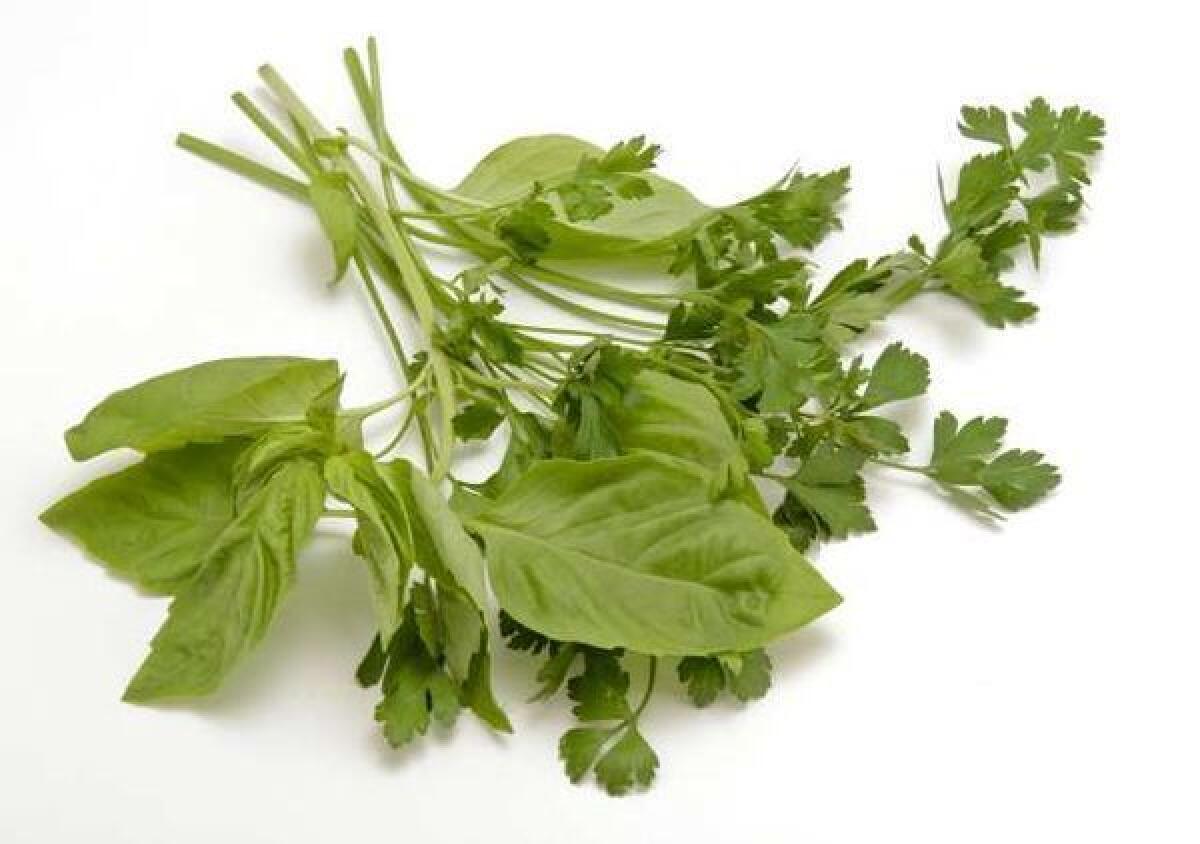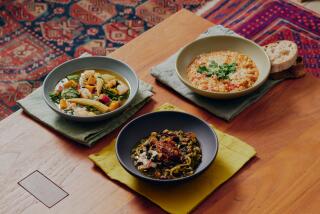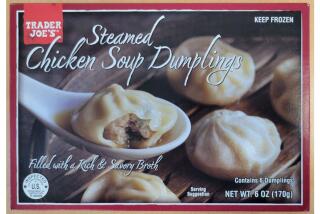Test Kitchen tips: Fresh vs. dried herbs and spices

So when should you use fresh herbs in a recipe? And when do you go for the dried? It can be a perplexing question, especially if the recipe is not specific.
I usually use fresh herbs and spices in recipes where I need them to impart flavor quickly, such as salads and recipes where there is no cooking involved, or when the herb or spice is added at the very end (folded into a sauce before serving, or added at the last minute to a slow-simmered stew). I tend to stay away from fresh herbs if I have a recipe that requires them to cook for longer than 45 minutes.
The flavor of dried herbs and spices is concentrated because the moisture has been removed. Dry herbs shine best when they’ve had a chance to rehydrate and slowly infuse a recipe with pronounced flavor. I love to layer them when I’m doing a recipe that requires long cooking times -- toward the beginning of a stew or a long-cooked sauce, even in marinades.
As always, keep in mind that dried herbs and spices will lose their flavor over time, and jars should be replaced at least once a year.
If you have any kitchen tips or questions you’d like me to explore, leave a comment below or shoot me an email at [email protected].
ALSO:
Go behind the scenes at the Test Kitchen
134 recipes for your favorite restaurant dishes
Browse hundreds of recipes from the L.A. Times Test Kitchen
You can find Noelle Carter on Facebook, Google+, Twitter and Pinterest. Email Noelle at [email protected].
Chicken with herbed cornmeal dumplings
Total time: About 2 hours
Servings: 6
1 (5-pound) chicken
Salt
Pepper
3 tablespoons olive oil
2 cups diced onion, cut into small (1/4-inch) dice (about 1 large onion)
1 cup diced carrots, trimmed (peeling optional) and cut into small (1/4-inch) dice (about 2 medium carrots)
1 cup diced celery, trimmed and cut into small (1/4-inch) dice
1/4 cup thinly sliced leek, cleaned and sliced crosswise into 1/8-inch strips (white and light green only, about 1/2 of 1 medium leek)
1/2 cup dry white wine
2 cloves garlic, smashed
3 sprigs parsley
2 sprigs thyme
1 bay leaf
10 cups water, plus 1/3 cup boiling water, divided
1/2 cup cornmeal
1 cup (4.25 ounces) flour
2 teaspoons baking powder
1 egg
1/4 cup milk, divided
1 1/2 teaspoons lemon juice
2 tablespoons chopped fresh herbs (such as tarragon, chives, thyme and parsley)
1. Cut up the chicken: Remove the giblets, saving the neck (discard the remaining giblets, or save for another use). Using a pair of kitchen shears, cut along the back of the chicken, removing the backbone. Cut or break the backbone into thirds (this will help to flavor and thicken the broth). With a sturdy French knife or cleaver, halve the chicken lengthwise down the breast. Cut each chicken half into 4 pieces, separating the leg and thigh, and halving the breast crosswise (the wing can remain attached to the breast or separated). Sprinkle the chicken pieces (including the neck and back) with 1 1/2 teaspoons salt and several grinds of pepper, evenly seasoning the pieces.
2. Heat a large, sturdy stockpot over high heat. When hot, add the olive oil and enough chicken to fit comfortably in a single layer. Brown the chicken on all sides, about 15 minutes (this will probably need to be done in 2 batches). Remove the chicken to a bowl and repeat until all the chicken is browned.
3. Reduce the heat to medium-high. To the fat in the pot, add the chopped onion, carrots, celery and leek, cooking until the vegetables just begin to color, 8 to 10 minutes, stirring frequently.
4. Stir in the white wine and cook, scraping any flavoring from the bottom of the pan. Continue to cook until the wine is almost evaporated, 2 to 3 minutes.
5. Add the garlic, 3 sprigs parsley, thyme and bay leaf to the pot, and add back the chicken.
6. Pour in 10 cups water (this should more than cover the chicken), loosely cover the pot and bring the liquid to a boil. Reduce the heat to a gentle simmer and cook, loosely covered, until the chicken is very tender, 45 minutes to an hour. Periodically skim the fat that forms on top of the broth as the chicken cooks.
7. When the chicken is tender, remove the pieces to a large plate or baking dish until cool enough to handle. Strain the chicken broth into a separate 3-quart pot, discarding the vegetables and herbs. You should have about 10 cups of broth. Skim any remaining fat from the broth, and season to taste.
8. Remove the skin from the chicken pieces and peel the meat from the bones. Shred the meat into bite-sized pieces; you should have about 6 cups of chicken. Place the meat in a bowl and set aside while you make the dumpling batter.
9. To make the dumplings: In a medium bowl, whisk together the cornmeal and one-third cup boiling water. Cover the bowl with plastic wrap and set aside until the mixture cools, about 15 minutes. Stir in the flour, 1 teaspoon salt and the baking powder, breaking up any cornmeal clumps with your fingers.
10. In a small bowl, whisk together the egg and 2 tablespoons milk. Pour the milk mixture into the medium bowl, and drizzle over the lemon juice. Stir to combine, then gently fold in the herbs until evenly distributed. This should form a thick batter (it should have the consistency of thick cement, sticky yet spoonable). Add more milk if needed to thin the batter, 1 tablespoon at a time. (You may not use all of the milk.)
11. Bring the broth to a gentle simmer on the stove. Spoon 1-inch balls of the batter (the dumplings will expand as they cook) into the simmering broth; this makes about 20 dumplings. The dumplings will sink at first but will soon float; continue to simmer, loosely covered, until they are just cooked through, about 15 to 20 minutes. Strain the dumplings onto a large plate or baking dish.
12. Add the shredded chicken back to the broth. Serve immediately, adding dumplings back to each serving.
Each serving: 688 calories; 55 grams protein; 36 grams carbohydrates; 3 grams fiber; 33 grams fat; 8 grams saturated fat; 234 mg. cholesterol; 5 grams sugar; 940 mg. sodium.
More to Read
Eat your way across L.A.
Get our weekly Tasting Notes newsletter for reviews, news and more.
You may occasionally receive promotional content from the Los Angeles Times.








